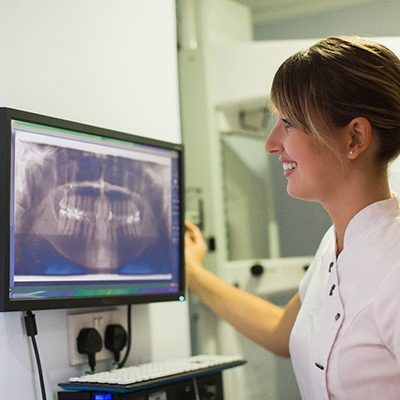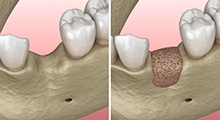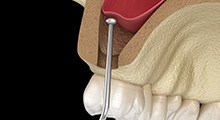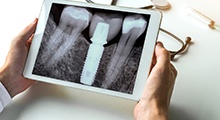Dental Implants — McKinney, TX
A Permanent Solution to Tooth Loss
When a tooth goes missing, the jawbone loses stimulation from the root. As a result, the body diverts those nutrients elsewhere in the body, leaving the jawbone weaker and less able to provide adequate support for the remaining teeth. Out of the options for replacing missing teeth, dental implants are the only choice that replaces the entire tooth structure, including the root. As such, it’s the only tooth replacement option that can prevent jawbone deterioration after tooth loss! At Archway Dental, Dr. Parmar is able to offer this treatment to give you back your smile’s confidence, strength, and beauty. Are you interested in knowing if you qualify for dental implants in McKinney, TX? Contact us today to schedule a consultation!
Why Choose Archway Dental For Dental Implants?
- Compassionate Dentist with Years of Experience & Advanced Training
- Dental Implant Surgery & Restoration Conveniently Completed In-Office
- Replace Any Number of Missing Teeth for Life
What Are Dental Implants?
A dental implant is a small, screw-shaped post. Typically, they’re made of a biocompatible material called titanium. Once the dental implant is inserted directly into the jawbone, it will gradually fuse with the surrounding bone tissue. After several months of healing, it will essentially be part of the jaw! This strong foundation provides lifelike functionality, stability, and comfort that simply can’t be replicated by other tooth replacement options. One or more dental implants can be placed in the jawbone to restore any number of missing teeth with a custom-made crown, bridge, or denture. The end result is a beautiful smile that looks, feels, and functions as if there were never any missing teeth to begin with!
The 4-Step Dental Implant Process

A dental implant is a small, screw-shaped post typically made of a biocompatible material called titanium. Once the dental implant is inserted directly into the jawbone, it will gradually fuse with the surrounding bone tissue and essentially become part of the jaw after several months. This creates a strong foundation that provides lifelike functionality, stability, and comfort that simply can’t be replicated by other tooth replacement options. The team at Archway Dental can place one or more dental implants to restore any number of missing teeth with a custom-made crown, bridge, or denture, resulting in a beautiful smile that looks, feels, and functions as if there were never any missing teeth to begin with! Here’s a brief guide to the dental implant placement process, but please contact us online if you have any questions.
Initial Dental Implant Consultation
The first step to receiving dental implants is having a consultation with Dr. Parmar, during which she will inspect your mouth and review your oral health and medical history to ensure that you are a suitable candidate. If she finds that you aren’t ready to receive dental implants, you may be able to become a good candidate after receiving treatments such as gum disease therapy, tooth extractions, or bone grafts. Once you’re cleared for dental implants, we’ll be happy to develop an appropriate treatment plan and make sure that you understand the associated costs.
Dental Implant Surgery
We place dental implants in-house, meaning that you won’t have to worry about dealing with a separate oral surgeon who uses a different pricing structure. To place a dental implant, Dr. Parmar will begin by administering a local anesthetic to ensure your comfort, and you may also receive sedation treatments if needed. She will then make an incision in your gum tissue where the restoration will be placed before inserting the titanium post into the jawbone. After this, she will close the wound in the gums and place a protective cap over the post.
Dental Implant Osseointegration & Abutment
In the months after your implant is placed, the titanium post will fuse with the surrounding bone tissue through the natural process of osseointegration. Once this is complete, you will come back to our office for a minor procedure to have the abutment piece placed on top of the post. Your customized restoration will be crafted based on impressions of your mouth while you heal over the following weeks.
Delivery of Dental Implant Restoration(s)
When your crown, bridge, or denture is complete, you’ll come back to our office so it can be securely attached to your implant or implants. We’ll make sure that your restoration fits comfortably and make any necessary adjustments. You’ll then be all set to greet the world with your beautifully restored smile.
Benefits of Dental Implants

Because dental implants replace the root and the crown of the missing tooth, they keep the jawbone stimulated and strong, helping it retain its shape. This helps the jawbone give the remaining teeth enough support to avoid future tooth loss. In general, dental implants are about 98 percent successful even 10 years after placement! Their nature-mimicking structure allows them to offer many other benefits that dentures and bridges alone do not.
Day-to-Day Benefits

Being grounded in the jawbone, implants are far more secure than traditional tooth replacements. As a result, you can talk, laugh, smile, and eat in public without thinking about your mouth! You don’t have to be concerned that your prosthetic teeth will slip out of place or embarrass you at inopportune times. Also, you can be sure that your jawbone will keep its youthful shape day after day, helping you have more confidence.
Health Benefits

In fact, dental implants can restore up to 70 percent of your original biting force, whereas dentures only manage to give you about 25 percent of the biting force you used to have with natural teeth. With a more powerful bite, you can enjoy more nutritious foods and a varied diet, potentially giving you a longer, healthier life. At minimum, you can have a higher quality of life! The increased stimulation for the jawbone also helps to keep it strong even as you age.
Long-Term Benefits

Dental implants can go a long, long time before needing replacement. In fact, dental implants have been known to last more than 30 years! Basically, you could enjoy your replacement teeth for the rest of your lifetime. Plus, one of the most convenient aspects of dental implants is that they require the same daily maintenance as natural teeth, meaning you just need to brush and floss them (and come to our office for regular checkups, of course).
How could dental implants change your life for the better? Schedule a consultation with us to find out!
Who Dental Implants Can Help

Another benefit of dental implants is that they can be used in basically any tooth-replacement scenario. In other words, whether you need to replace just one tooth or a whole arch, you shouldn’t hesitate to schedule an appointment with us. In the meantime, you can read on to learn the qualities we look for in a good candidate as well as the different types of dental implants available.
Who Is a Good Candidate for Dental Implants?

In order to determine if you’re a good candidate for dental implants in McKinney, Dr. Parmar will review your medical and dental history as well as conduct a comprehensive oral exam. The goal is to determine:
- If your jawbone is strong enough to support dental implants
- If you are in good overall health
- If your teeth and gums are healthy
- If you’re willing to break bad habits, like smoking
If it’s a “yes” across the board, then she will answer any questions you have, discuss the different types of dental implants, and get to work creating your custom treatment plan.
Missing One Tooth

Previously, dental bridges were the most common solution, which anchored the prosthetic tooth in place with two dental crowns. Now, there is another option: a single dental implant. Once the post is placed into the jawbone, we’ll place a connector and the dental crown on top. Not only will the final result look and feel natural, but it should last for several decades if you take good care of your smile!
Missing Multiple Teeth

Regardless of the location of your missing teeth, we can combine just a few dental implants to hold onto a dental bridge or partial denture. One of the biggest perks of implant-retained restorations is that they don’t rely on (or potentially damage) the teeth around the missing ones, which helps you preserve more of your natural, healthy smile. Of course, there are several other reasons this smile-rebuilding solution is so popular, including that the materials used are extremely durable and stain-resistant!
Missing All Teeth

Even if all your teeth are missing, dental implants can be used to restore your smile. If we determine that this is the best tooth-replacement solution for you, then we will secure your full denture in place with four to six strategically placed implant posts. With this added stability, you can chew, smile, and speak just as you did before – all without worrying that your replacement teeth will slip out of position.
Understanding the Cost of Dental Implants

There isn’t a set price for dental implants because the amount is determined by a patient’s individual needs, like how many teeth you’re replacing. This affects the number of implant posts and abutments that are needed, as well as the type of restoration. Although it costs more to replace several teeth at once, it’s more cost-effective than treating each tooth individually. Keep reading to learn more about the cost of dental implants in McKinney, so you are better prepared.
Preliminary Treatments & Dental Implant Surgery
Making sure your oral anatomy is in optimal shape is essential for dental implant success. This is why we will evaluate your oral health to determine if additional treatment is required. Tooth extractions, bone grafting, gum disease treatment, etc., may be necessary; if so, they will be included as part of your total cost.
Your implant placement oral surgery will also incur a fee, and since the entire process is provided in-house, it will be combined with the other components to create a comprehensive cost breakdown. You should not receive any additional bill from an outside specialist.
The Parts of Your Dental Implant
You can expect our Archway Dental team to also consider other aspects of your dental implant process before establishing a cost estimate:
- How Many Dental Implants: Do you need one or six? The more we are required to place, the higher the expected price.
- Type of Restoration: A dental crown will cost less to create than an implant denture; however, creating a prosthetic that attaches to implants and replaces an entire row of teeth is more cost-effective than traditional dentures.
- Material Used: Dental implants are commonly crafted from titanium or zirconia, depending on the dentist and patient’s preference.
- Manufacturer: Dental implants are crafted by various manufacturers, which means some are cheaper than others. Our team will explain how we choose which ones to use and why quality products lead to longer results.
How Dental Implants Can Save You Money
While dental implants are initially more expensive than dentures or dental bridges, they are more affordable long-term because they can easily last a lifetime. Traditional tooth replacement options need to be replaced every several years, which means dental implants can potentially save you thousands of dollars on replacements! Dental implants are also the only treatment to stop bone loss in your jaw, which helps prevent future tooth loss and lowers the cost of caring for your smile.
Does My Dental Insurance Cover Dental Implants?
Although every policy differs, many dental insurances will cover a portion of the cost of the treatment, like the consultation or restorations. However, you’ll be unlikely to find a plan that offers full or partial coverage for the oral surgery that is required. Fortunately, our Archway Dental team is here to work on your behalf with your insurance carrier to lower the amount you need to pay out of pocket.
Making Dental Implants Affordable
If you need help covering the remaining balance of your dental implant treatment, we not only offer the Archway Dental Family Plan but also access to flexible financing. Our in-house plan allows you to pay a flat annual fee for access to preventive services and discounts on other available treatment options.
There is also the option to enroll in a monthly payment plan through CareCredit, Cherry, Lending Club, and Alphaeon Credit so that you can avoid high upfront costs.
Advanced Dental Implant Procedures

The roots of your teeth stimulate blood flow in your jawbone, which ensures the tissues get the nutrients they need to stay strong. When a tooth goes missing and stimulation ceases in that part of the jawbone, the tissue will gradually be reabsorbed into the body. While a dental implant will functionally replace the roots of a missing tooth once in place, there needs to be adequate remaining jawbone tissue for successful placement.
Many patients who are dealing with extensive or prolonged tooth loss may not have enough jawbone density to be eligible for dental implants right away. Fortunately, advanced dental implant procedures may be able to help! Treatments like bone grafting, sinus lifts, and ridge expansions are designed to help patients with low jawbone density achieve a healthy foundation for their new smile!
Bone Grafting

For a bone graft, we’ll take bone tissue from another part of your body (or from a donor). This grafting material is then placed onto the weakened part of your jawbone that needs to be thickened. Then, the tissue around the area is closed over it for healing. Over the coming months, the grafted material will integrate with the jawbone, which will naturally promote new bone tissue growth. Once you’ve fully healed, your jawbone will be dense enough to properly support your dental implants.
Sinus Lifts

Your sinus cavity sits just above your upper back molars. If the jawbone is too thin in these areas and you attempt to place a dental implant, the dental implant could end up poking into the sinus cavity! Not only would this be very uncomfortable and leave you susceptible to infection, but the dental implant wouldn’t have enough tissue to fuse with and would likely fail.
A sinus lift is a specific type of bone graft that can address this. A window will be made in your jawbone to access the thin membrane that holds your sinus cavity. The membrane is carefully pushed up and away from the jawbone, and then the empty space is filled in with bone grafting materials. The area is sealed again, and within a few months, that area of your jawbone should be thick enough to accommodate a dental implant.
Ridge Expansion

In some cases, your jawbone ridge may not be wide enough to fully encompass a dental implant. A thin dental ridge can often be an issue for patients who have delt with severe tooth loss for an extended period of time. A ridge expansion can be used to provide more depth to the jawbone ridge. For this procedure, the jawbone ridge will be gently separated into two parts: the inner portion and the outer portion of your jaw. The space between is then filled with grafting material, which will encourage new tissue growth and thicken the ridge.
While treatments like ridge expansions, sinus lifts, and bone grafts will often add more time and expense to your dental implant treatment, they will maximize your chances of a successful treatment with results that last a lifetime!
Dental Implants Post-Op Instructions

At Archway Dental, our team is specially trained on placing dental implants, meaning we can complete the entire process from start to finish in one convenient location. To ensure you make a smooth sailing recovery, we’ll provide you with post-op instructions directly following your surgery. Should you have any questions or concerns during your recovery, don’t hesitate to reach out to us for assistance. Below, we’ve included some dental implant post-op instructions to help you navigate the healing period.
What to Do Directly After Dental Implant Surgery

Dental implant surgery is certainly one of the most taxing parts of the entire process. However, you can expect to make a speedy, smooth sailing, and comfortable recovery with proper care and maintenance. By following Dr. Parmar’s aftercare instructions diligently, you’ll be one step closer to having a fully restored smile!
While you recover, it’s crucial that you leave the blood clot on your surgery site untouched. To do this, be sure to avoid:
- Spitting (use tissues or swallow your saliva)
- Drinking from a straw
- Smoking or using tobacco products
- Touching the surgical site with your tongue or fingers
Common Side-Effects

Have you ever had oral surgery before? If not, you’re probably unsure which symptoms are considered normal and which aren’t. Fortunately, knowing what to expect can help you better understand when you should be seeking help.
That said, here’s what you will experience in the first few days following your procedure:
- Intermittent Bleeding – You can control your bleeding by placing clean gauze over the area and applying light pressure. It can continue for several days after your surgery.
- Swelling – This can occur for 72 hours following your procedure, sometimes even over a week. You can reduce swelling by using a cold compress on the outside of your cheek over the area where you feel pain.
- General Discomfort – Although you will experience discomfort as you heal, it should gradually fade with time. You can relieve it by taking prescribed or over-the-counter pain medication.
Diet

It’s best to stick to a soft-food diet for the first few days following your procedure. With that in mind, here are some foods you should stock up on before your surgery:
- Mashed potatoes
- Yogurt
- Ice cream
- Pudding
- Soup (don’t make it too hot!)
- Scrambled eggs
- Pasta
You can return to a normal diet as soon as you feel up for it. However, you’ll still want to exercise caution around crunchy or tough foods and avoid chewing directly on the implant site.
Health & Oral Hygiene

It’s incredibly important that you take proper care of your teeth and gums after dental implant surgery to avoid complications. When you brush your teeth, do it as you normally would but be careful around the surgical site. You’ll also want to rinse with warm salt water two to three times a day and after each meal. Avoid using any mouthwash that contains a high level of alcohol as it can irritate your oral tissues or dry out your mouth.
What to Do After Your New Teeth Are Attached

Once you’re healed and the implants have successfully fused with your jawbone, you’ll return to the office for the final step. Dr. Parmar will place your restoration (i.e., crown, bridge, or denture) and complete your smile. If you experience mild sensitivity or discomfort after this step, you can manage it with a prescription or over-the-counter pain medication. Should you experience bleeding or swelling, contact our team right away – those aren’t normal side effects after restoration attachment.
Maintaining & Caring For Your Dental Implants

Out of all the tooth replacements you could choose, dental implants have shown to be one of the most reliable and longest-lasting solutions out there. However, you still need to make sure you are taking proper care of them on a day-to-day basis. Otherwise, you could be putting them at risk of failure. Thankfully, practicing these steps is relatively straightforward when you know what to do. Take a look at our recommendations below and give us a call if you have any questions on how to best take care of your new dental implants!
Make Oral Hygiene a Priority

Implant restorations cannot develop decay, but oral bacteria can still infect the gum tissue surrounding the implant, causing it to fail. For this reason, at-home oral hygiene needs to be at the top of your to-do list when it comes to maintaining your dental implants. Brush for at least twice a day with fluoridated toothpaste and floss once a day. Make sure you brush for at least two minutes. It’s also worth adding an oral rinse to your routine if you have not already.
Eat a Healthy Diet

Whether you have dental implants or not, the foods you eat will have a direct impact on your long-term oral health. For example, eating excessive starches and sugars makes it easier for oral bacteria to create plaque acids that cause dental disease. Make sure your meals consist of a balance of fruits and vegetables throughout the day and use extreme caution whenever eating hard or tough foods.
Break Bad Habits

Dental implants may be strong, but they are not indestructible. Just like regular teeth, they can crack or chip if exposed to extreme pressure or severe trauma. That means you should never use your teeth for tasks that would be better suited for a tool. For example, use scissors or a box cutter to open packages or a bottle opener to crack open your favorite beverage. Never use your dental implants (or natural teeth for that matter) if you want them to last.
Protect Your Dental Implants

If you are an active person who enjoys contact sports, you may already know how important it is to wear the right protective gear to prevent physical injury. The same applies to your teeth, especially if you enjoy football, basketball, boxing, karate, wrestling, or another sport where the risk for impact is high. Custom-made mouthguards (and nightguards if you clench and grind your teeth at night) not only offer better comfort, but optimal and long-term protection.
Schedule Regular Dental Checkups

Checkups should be completed once every six months so our office can confirm your implants are remaining healthy and no complications have developed. Routine checkups also give us a chance to examine the results of your at-home oral regimen. In the event something is not quite right, Dr. Parmar will be able to catch it sooner, rather than later, then recommend a treatment to prevent your issue from getting worse.
Dental Implant Failure & Salvage

When placed by a skilled dentist like Dr. Parmar, dental implants have a remarkable success rate of 95-98%. Of course, this means there is a small chance of dental implant failure occurring. If you’re experiencing discomfort or pain near your implant, we ask that you call us as soon as you can. That way, we can do our utmost to preserve your newly rebuilt smile with dental implant salvage.
Dental Implant FAQs
Does Getting Dental Implants Hurt?
Before the procedure begins, your mouth will be numbed with a local anesthetic. You will also most likely be sedated which lowers your body’s ability to register pain. Because of these measures, you shouldn’t feel any pain throughout the duration of the placement procedure. However, your mouth may be sore for a few days afterwards. Fortunately, there are steps that you can take to manage this discomfort. Take prescribed and over-the-counter medication as directed, and use a cold compress. If the discomfort worsens instead of improving after two to three days, give us a call.
What Can Cause Dental Implants to Fail?
It is highly uncommon, but dental implant failures can occur, usually for one of two reasons.
- Peri-implantitis: This is a form of gum disease that can develop as a result of poor oral hygiene. This can damage the bone and gums supporting the implant and ultimately cause the implant to fail over time.
- Failed Osseointegration: Sometimes, the implant fails to integrate with the jawbone, especially in patients who had low jawbone density to begin with. This is why it is so important that you have a strong, healthy jawbone before moving forward with the procedure.
Other causes of dental implant failure include chronic teeth grinding, tobacco use, poor oral hygiene, certain medications, radiation to the head and neck, and certain health conditions, like diabetes, cancer, osteoporosis, and autoimmune disorders.
Will I Have to Take Off Work for Dental Implant Surgery?
Most patients only need to take one or two days off work when they get dental implants, but everyone is different. If your job is physically demanding, you may want to take at least three to four days off. Heavy exercise can divert blood from the implant site and delay healing. Dr. Parmar will be able to give you a more specific recommendation for your individual case.
Can I Get Dental Implants If I’m Diabetic?
If your diabetes is under control, your odds of dental implant success are generally comparable to those of nondiabetic patients. However, uncontrolled diabetes can slow down the healing process and make it more difficult for your implants to integrate with your jawbone. If you are looking to get dental implants, talk with your endocrinologist or primary care doctor about getting your blood sugar levels under control before moving forward in the dental implant process.
How Successful Are Dental Implants?
Dental implants have a startlingly high success rate. It’s been found that over 95% of dental implants are successful at 20 years so long as you take care of them. You’re in good hands with us, so you can depend on our expertise for a successful surgery.
Long-term, the viability of your dental implants depends on a few factors. For one, molars will receive more stress on a daily basis, meaning that they’re more likely to fail early. You also need to keep up with your dental hygiene, including seeing us for preventive care twice a year.
What Should I Do If My Dental Implant Feels Loose?
If you ever notice that your dental implant is loose, this is a sign of impending failure. This is especially true if you’re experiencing a fair amount of pain or swelling around the area.
However, the jawbone doesn’t have any nerve endings in it, meaning that it’s possible that the implants could come loose without you feeling it. It may also happen that your restoration could come loose from the rest of your implant. Whatever the case, you should tell us as soon as possible if your dental implant feels insecure.
Will People Be Able to Tell That I Have Dental Implants?
When crafting your dental implants, we’ll take meticulous digital impressions of your teeth and work hard to ensure that your dental implant looks as realistic as possible. Moreover, we make use of the highest quality materials in our dental implants. As a result, it should be close to impossible for someone to notice that your tooth isn’t real unless you tell them.
Do Dental Implants Decay?
The ceramic and metal that your titanium is made out of are resistant to the bacteria that cause enamel erosion, meaning that you don’t have to worry about your dental implants developing any kind of tooth decay.
However, your natural teeth are still just as susceptible to cavities as they’ve always been, and you can still wind up with gum disease. Just because your dental implants are resistant to decay doesn’t mean that you can ignore your dental hygiene.

